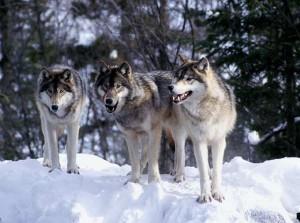by Justin King / Digital Journal

Photo: LA Times
A federal judge denied conservationist efforts to stop the trapping and killing of two wolf packs in Frank Church River of No Return Wilderness in Idaho. The judge ruled that since federal officials have not yet determined if killing the wolves is in violation of the Wilderness Act, state officials could kill them. The wolves were targeted for extermination because they were preying on wild elk in the federally protected wilderness area. Idaho Fish and Game contracted the trapper in 2013 claiming concerns over dwindling Elk populations. However, the agency has not stopped Elk hunting in the area. Previously, wolves were hunted to the brink of extinction in the area. In the mid-1990s wolves had to be brought from Canada to reintroduce them to the area.
The Rocky Mountain Elk Foundation (RMEF) stated in a press release that it supports the efforts of Fish and Game to eliminate the wolves. While the RMEF sounds like an environmental organization, it should be noted that the organization’s website is almost entirely dedicated to hunting Elk. There is an interactive map to plan an Elk hunting expedition, tips on how to use antlers to attract elk, and much more. Judge Edward Lodge sided with Idaho and the U.S. Forest Service after he found that federal land managers had not determined if the eradication program violated the Wilderness Act. He said in his ruling No final agency action has been taken in regards to the Wilderness Act,
The fact that the U.S. Forest Service and federal land managers do not have clear guidelines shows an institutional ineptitude that spans decades. The Wilderness Act was signed into law in 1964. Apparently after fifty years, federal agencies are still unable to determine if the eradication of a recently recovered species in a wilderness area is against its own regulations.
Jonathon Proctor, of Defender of Wildlife said We don’t believe that killing wolves to artificially increase elk herds for hunters is a legitimate way to manage a wilderness, which is not an elk game farm,
Conservationists are appealing the decision. It seems evident that, once again, a state Fish and Game agency is using wilderness areas as game farms and is bowing to the pressures by pro-hunting lobbying efforts.

